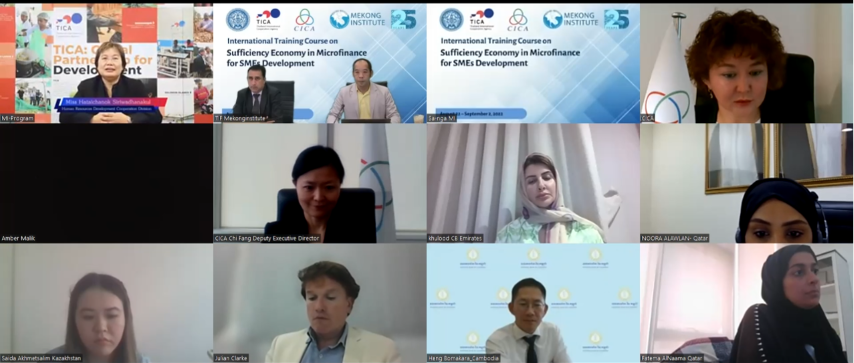The Mekong Institute (MI) has concluded a virtual International Training Course on the Sufficiency Economy in Microfinance for SME Development that was held from August 22 – September 2, 2022.
The Institute thanks the Thailand International Cooperation Agency (TICA), in collaboration with the Conference on Interaction and Confidence Building Measures in Asia (CICA), for making this course possible.
Since 1991, this training has been one of the flagship programs of TICA’s Annual International Training Courses (AITC). AITC offers not only a training experience, but also a platform for enriching professional networks and sharing ideas between international participants.
The Sufficiency Economy framework was introduced in 1974 by His Majesty the late King Bhumibol Adulyadej. It encourages people to live productive lives that create a foundation for family and society. The Sufficiency Economy Philosophy (SEP) has been incorporated into the development philosophy of the Royal Thai government. Such training provides practical knowledge and skills that enhance the capacity of business people, government officials, and development agencies to foster similar approaches to their work.
At the opening session Mr. Madhurjya Kumar Dutta, Director of the Trade and Investment Facilitation (TIF) at the Mekong Institute, said
Improving access to finance for SMEs is key to running a business. The sufficiency economy philosophy (SEP) is Thailand's homegrown approach to development. The knowledge gained from learning about the ‘sufficiency economy’ can be applied to many sectors including SME development. In addition to practical knowledge, the participants gain a new perspective on microfinance for SMEs. The training introduces concepts and applications that guide them toward the ‘sufficiency’ concept, hopefully providing a new framework by which to conceptualize ‘SEP’ in the context of enhanced and diversified financing for SMEs
she said.
A total of thirty-eight (38) participants comprising mid-and -senior level officials from central banks, academic institutions and members of the CICA attended the training. The participants, who hailed from Bangladesh, Cambodia, Cameroon, Egypt, Iran, Jordan, Kazakhstan, Palestine, Qatar, and the United Arab Emirates, were drawn from the microcredit/microfinance and banking sectors.
The training program was made up of modules devoted to various aspects of the ‘sufficiency economy’. These included (1) Concept and Overview of the Sufficiency Economy Philosophy (SEP); (2) Concept and Overview of SME and Microfinance for SMEs Development; (3) Establishment of Community-based Microfinance; (4) Regulatory and Government Support for Microfinance Development; (5) Financial Inclusion and Poverty; (6) Sociological Framework of Rural Community-based Microfinance; and (7) Sustainability and Responsible Investment in Microfinance.
The participants were able to acquire knowledge and skills from an international panel of microfinance professionals. These included trainers from the Community Development Department, Ministry of Interior, the Agricultural and Food Marketing Association for Asia and the Pacific (AFMA), the Asia Pacific Rural and Agricultural Credit Association (APRACA), the Bank for Agriculture and Agricultural Cooperatives, Lincoln University, New Zealand, Khon Kaen University, Thailand and MI in-house experts who shared their knowledge and experience in microfinance for SME development.
At the closing session, Ms. Sholpan Yelkeyeva, Senior Officer of the CICA Secretariat, noted that the course provided a valuable platform that was well aligned with similar principles outlined in the ‘Conference on Interaction and Confidence Building Measures in Asia’.
The seven comprehensive, inter-related modules of the course set out an easy-to-follow approach to community-based microfinancing,
she said “This is an important mechanism for SME development. The training helped the participants to identify ways to apply the concepts nationally.”








